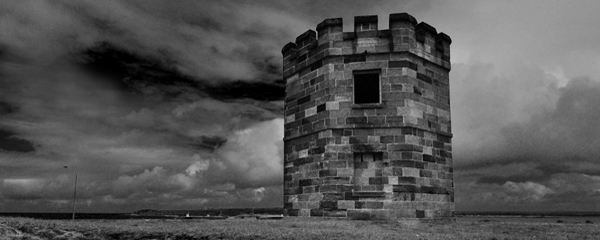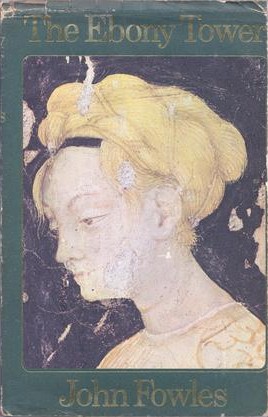
('La Perouse' © Slilin...(brb), 2014)
JOHN FOWLES: A RATIONAL MAGIC
by GEOFFREY HEPTONSTALL
The novels of John Fowles have a wide readership and almost all the critical attention he has received has been focussed on them, shunting his short stories into the ‘also’ category, alongside reviews, translations and other marginalia. This is surely an oversight in need of some revision when we consider that fiction was the primary focus of Fowles’ literary output. The novels claim our attention, often it may seem, at the expense of his other creative endeavours.
The Ebony Tower is an arresting title partly because it looks half-familiar, and partly because it subverts the familiar. Ebony is dark. It is of ‘the other’, a race apart, a continent unknown. There is a suspicion of a dark magic in the title, a hint of the strange and the forbidden. To the European prejudice, that relic of colonial history, an area of darkness is as fearful as it is tempting. The title promises much.
It is the only collection of short fiction by Fowles; a mid-career pause in the novels and essays on which his reputation generally rests. The stories throw an interesting light on the author’s approach to fiction. By his own account they were written in part as a commentary on the themes of his longer fiction. There were three novels before the collection and three after. The pivotal position of the stories, their relation to the novels, and the intrinsic value of the stories themselves elevates them above the ‘also’ category.
 The reputation of John Fowles, the undeniable aura that encompasses his name, can prove to be a stumbling block when examining his work. Making a late debut, his public identity grew out of a maturity of demeanour in his writing. Many of his ideas were formed before he emerged into publication. Unusually, prior to his first book, The Collector, published in 1963, he had no history of publication. He quickly became a respected and widely-read novelist and the public saw nothing of his apprenticeship. By the age of thirty-seven he was famous and, that rarity, a very popular writer able to command serious critical interest. This achievement did not come without effort; it was the product of uncommon enterprise. His notebooks and rough drafts show his first attempts at writing, a spare time aspiration for one on the academic margin with a slowly evolving capacity to record his thoughts and feelings on paper. An early manuscript recounting his time on the Greek Island of Spetsai caught the eye of agent Paul Scott (a noted writer himself), who suggested Fowles might have a novel in him. It was a characteristic remark of its time. The term ‘creative non-fiction’ did not exist and would scarcely have been understood. It was, however, a form in which Fowles soon came to excel. He had the storyteller’s narrative gift combined with a curiosity about the natural world and our place within it.
The reputation of John Fowles, the undeniable aura that encompasses his name, can prove to be a stumbling block when examining his work. Making a late debut, his public identity grew out of a maturity of demeanour in his writing. Many of his ideas were formed before he emerged into publication. Unusually, prior to his first book, The Collector, published in 1963, he had no history of publication. He quickly became a respected and widely-read novelist and the public saw nothing of his apprenticeship. By the age of thirty-seven he was famous and, that rarity, a very popular writer able to command serious critical interest. This achievement did not come without effort; it was the product of uncommon enterprise. His notebooks and rough drafts show his first attempts at writing, a spare time aspiration for one on the academic margin with a slowly evolving capacity to record his thoughts and feelings on paper. An early manuscript recounting his time on the Greek Island of Spetsai caught the eye of agent Paul Scott (a noted writer himself), who suggested Fowles might have a novel in him. It was a characteristic remark of its time. The term ‘creative non-fiction’ did not exist and would scarcely have been understood. It was, however, a form in which Fowles soon came to excel. He had the storyteller’s narrative gift combined with a curiosity about the natural world and our place within it.
John Fowles as a writer may be urbane, but his preferred locale is the wilder, more remote places. Landscape and nature are the subject of a late triptych of major essays: ‘Islands’, ‘The Land’, and ‘The Tree’. These and other pieces describe a world view that is also present in the author’s fiction. The locations in The Ebony Tower are Brittany, Dorset, Provence and Medieval Normandy. Only one is set in and near London. Tellingly, the metropolitan setting contrasts with the strangeness of the narrative’s theme.
‘The Enigma’ is the story of an unexplained disappearance. A highly respectable Conservative politician vanishes without trace for no discernible reason. It is our worst nightmare realised. We speak of political dissidents ‘disappearing’. To disappear is not simply to die but to be eradicated. What memories remain are certain to become overshadowed by the disappearance. The story poses an enigma: the politician could have chosen this ending in order to be remembered for something, finding it preferable to a conventional obituary and subsequent oblivion. ‘The tender pragmatisms of the flesh have poetries no enigma, human or divine, can diminish or demean – indeed it can only cause them, and walk out.’
Viewing Fowles’ world from his dark tower, we are invited to witness the strange and wild things that may be found unexpectedly close at hand. ‘The Ebony Tower’ itself is a one hundred-page novella concerning a visit by a young aesthete and potential biographer to an elderly artist sequestered in a Breton chateau with two pretty, spirited young women. They serve the artist as muses and companions, although the nature of their presence is ambiguous and intriguing. Art for Williams, the young visitor, is a mystery whose secret he seeks to learn. Art is both the cache-sexe and the means toward fulfilment.
Somehow something of the former sexual bantam clung physically round his old frame; he could never have been particularly good-looking, but there must have been an attack, a devil about him, a standing challenge to the monogamous.
Eroticism is a constant theme, especially in relation to art. Here, as in other stories by Fowles, a young man pursues an elusive young women in a manner suggesting desire is an end in itself. The demands of the chase overwhelm the pursuer to the point of self-destruction. Breasley, the elderly artist, explains to Williams why one of the women is nicknamed Mouse. Breasley’s explanation is an inscription of the word Mouse with the ‘o’ drawn as a vagina. The joke is to be taken seriously: Williams is advised of the bounds beyond which he may not cross:
For one fleeting moment he thought he had found the answer. Something in her was still undecided. The maddening closeness, the silent complicity of everything around them – a few steps. a frantic tearing-off of clothes in the darkness, a sinking, knowing, possessing release.
Without turning she reached up and caught his right hand on her shoulder in the briefest grip. Then she was walking away.
In his visit, Williams encounters the powers of art and of love, how they may resemble each other, particularly in their capacity to challenge and change those who seek to understand them.
In the story ‘Poor Koko’, an intruder in an academic’s house gratuitously destroys years of careful research. A lifetime’s work is shredded before the scholar’s eyes. The scholar meets the challenge of wanton violence by determining to retrieve as much as he can by memory. It will not be too difficult, he decides. He almost feels that a favour has been bestowed, a chance to begin again, to approach his work with fresh perceptions and an accumulated wisdom: ‘I told myself I had been dreaming, that what had seemed to shatter must have done so in my nocturnal unconscious, not in external reality.’
This could be the writer himself speaking. A lost manuscript is both a tragedy and an opportunity. A sense of loss may engender the creative impulse. Our lives are made from choices, the discarding of one thing in favour of another. The working title for the collection was ‘Variations’, indicating how a narrative may develop in several ways.
 Every new fiction, Fowles has said, breaks ground like a scientific theory. If this is the case, the venture is subject to the test of authenticity. And yet the reality of fiction is not the tangible reality of the ‘real world’. Fiction is a work of artifice that is ordered and directed but storytelling is deeply rooted in human nature. The faculties of storytelling are intuitive because fiction discovers not what is verifiable but what is imaginatively possible. Art is primarily concerned with emotional truth. Significantly, Fowles speaks of our understanding of Nature as something within the realm of the intuitive. For him it is as much an art as a science. Our understanding of the natural world is shaped by the knowledge each of us may possess of ourselves. If, that is, such knowledge is a possession rather than a supposition. Natural knowledge is based on natural feeling.
Every new fiction, Fowles has said, breaks ground like a scientific theory. If this is the case, the venture is subject to the test of authenticity. And yet the reality of fiction is not the tangible reality of the ‘real world’. Fiction is a work of artifice that is ordered and directed but storytelling is deeply rooted in human nature. The faculties of storytelling are intuitive because fiction discovers not what is verifiable but what is imaginatively possible. Art is primarily concerned with emotional truth. Significantly, Fowles speaks of our understanding of Nature as something within the realm of the intuitive. For him it is as much an art as a science. Our understanding of the natural world is shaped by the knowledge each of us may possess of ourselves. If, that is, such knowledge is a possession rather than a supposition. Natural knowledge is based on natural feeling.
Intuition is the storyteller’s compass in explorations of the narrative. There may be a natural way for it to go. The story seemingly tells itself. Fowles’ capacity for narrative invention indicates not only charisma, a secular magic, but also an extraordinary comprehension of the human. The storyteller’s secret is to know how people are beneath their masks. We relish the truth revealed about others, and though we fear the revelation of our true selves, part of us longs to be known.
Yet storytelling is a mask; it employs metaphor. Its devices include allegory and romance, even when it seeks to transcribe actual experience. Juxtaposed with the realist tales is Fowles’ translation of ‘Eliduc’, an Old French romance by Marie de France. The inclusion is not incidental: it connects with Fowles’ general mien. He may be considered a fabulist, in that he relates extraordinary events in realist style. A number of his central characters spin an elaborate mystery about themselves. They seek to captivate, or even to capture, others by their delusory sense of self.
The girl was delighted to hear this command from her father. She stands up, invites Eliduc to sit with her well away from the others. Both are struck dumb with love.
There is usually an erotic impulse at work somewhere in the deception. We may find there is also an element of self-deception somewhere at work in the narrative. In both The Magus and The French Lieutenant’s Woman the deception appeals to the character’s vanity. A young man is told a story he wants to hear. It is also a story we want to hear. We as readers are intrigued, although the appeal is not to our vanity but to our desire to be told something that arouses our curiosity. We wish to be in on a secret. The secret is that the reality others take for granted is an illusion behind which the deeper reality lies. ‘Clouds’, the final story in the collection, sensitively explores the interplay of reality and illusion in the realm of desire.
The most frightening thing is not wanting love from anyone, or ever again […] To forgive nothing and give nothing and want nothing is what it all really meant, to settle for being taken like a parcel from one little island to the next, observing and judging and hating – or was it challenging? Surprise me, prove I’m wrong, string the islands together again?
Fowles has acknowledged the element of game playing involved in his fiction. He is manipulating the reader’s emotions. To read Fowles is an act of surrender to the game. To a degree that is true of any fiction writer, but the intensity of the demands Fowles makes on his readers is exceptional. His powerful authorial presence recalls the great Victorians, and it is a measure of his skill as a writer that the narrative of his fiction has such power to persuade.
~
 Geoffrey Heptonstall’s writes regularly for The London Magazine. 2016 saw the publication by Black Wolf of a novel, Heaven’s Invention, and two plays, Groby [performed 2015] and Who Are You? A third play was performed by Carabosse Theatre Co, Stony Stratford. He has written many short stories for publication or performance for A Word in Your Ear, Cerise Press, Gold Dust, Liars’ League, Litro, and Sunk Island Review.
Geoffrey Heptonstall’s writes regularly for The London Magazine. 2016 saw the publication by Black Wolf of a novel, Heaven’s Invention, and two plays, Groby [performed 2015] and Who Are You? A third play was performed by Carabosse Theatre Co, Stony Stratford. He has written many short stories for publication or performance for A Word in Your Ear, Cerise Press, Gold Dust, Liars’ League, Litro, and Sunk Island Review.
*
~
Photograph of John Fowles © Oliver Morris

